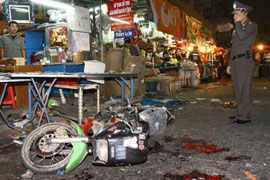New Year bombs strike Bangkok
Three killed and 38 wounded by nine explosions in the Thai capital.

There was no claim of responsibility.
Surayud Chulanont, the prime minister, indicated that domestic politics rather than the uprising in the country’s Muslim-majority south was behind the bombings.
“From the evidence we have gathered, there is a slim chance that it is related to the southern insurgency. It is likely related to people who lost their political benefits,” Surayud said, referring to the ousted government of Thaksin Shinawatra.
“The people who carried out the bombings were ill-intentioned people who want to have political impact. They want to create a scenario of a politically unstable Thailand,” he said.
“The kind of bombs used, the places they picked and the timing show that their intention was to cause panic and fear.”
The prime minister added that there were no intelligence reports that more bombings would occur.
In a possible sign that the government regarded Thaksin’s followers as the culprits, Prommin Lertsuridej, the top aide to the former prime minister, was ordered to report to the Council for National Security, made up of those who launched the coup.
At least nine of the wounded were foreigners – four Hungarians, three Serbians and two Britons – said Ajirawit Suphanaphesat, the deputy national police chief.
A third Thai man died in hospital on Monday.
An official at the Narenthorn emergency medical centre said: “One more man died at King Mongkut hospital early Monday.”
The man was not immediately identified.
Three bombs that exploded just after midnight on Monday were in a phone booth, a hotel, and near a canal bridge in a central area thick with hotels and shopping malls.
Celebrations
They went off near the planned venue for Bangkok‘s main New Year countdown party, cancelled hours earlier after the six initial blasts went off throughout the city, the largest one outside a shopping centre near the Victory Monument in the city centre. A police booth and a market were also targeted.
Mongkol Na Songkhla, the health minister, said the earlier bombs wounded 14 people seriously, while the rest were treated and released from hospitals.
Apirak Kosayothin, Bangkok‘s mayor, had told 5,000 revellers at the Central World Plaza shopping centre after the initial blasts, to go home “for the sake of peace and security”.
 |
| A Thai policeman (R) inspects the damage at a shop caused from a bomb |
The crowd dispersed quickly and calmly.
Hotels stepped up security, searching cars and cancelling expensive New Year’s Eve dinners.
The main public celebration was also called off in Thailand‘s northern hub city of Chiang Mai, although no incidents were reported there.
But New Year festivities continued in parts of Bangkok, with hundreds of tourists still partying into the night in Patpong.
Fireworks lit up the sky at midnight in both Bangkok and Chiang Mai, with many people still gathered in the streets.
Police and army troops guarded some entertainment venues, mass transit stations and traffic circles. Roadblocks were set up on some streets.
Several foreign embassies responded to the bombing by issuing updated travel advisories, warning that the threat of terrorism was high and advising their citizens not to travel within Bangkok and to avoid mass gatherings.
Political turmoil
Bangkok has rarely experienced deadly bombings, although several small explosives were set off during recent political turmoil in an apparent attempt to create a sense of instability, not to cause casualties.
Thitinan Pongsudhirak, a political scientist at Chulalongkorn University, said on Monday: “There are two potential suspects: Muslim insurgents and Thaksin’s residual power. I tend to think it’s residual power. I suspect the previous regime.”
Thaksin Shinawatra, the former prime minister, was ousted in a coup in September, but still commands widespread support in the country. A number of arson attacks in provincial areas have been blamed on his followers.
Thaksin’s lawyer, Noppadol Patama, was quoted on the Matichon newspaper’s website as saying that Thaksin was in China, and not involved in the bombings.
“He doesn’t do such things. If he wants to spark any movement, he won’t use violence,” Noppadol said.
Chiang Mai attack
Bombings and shootings occur almost daily in Thailand‘s three southernmost and majority Muslim provinces of Yala, Narathiwat and Pattani, where an uprising that flared in January 2004 has killed more than 1,900 people.
The separatists have carried out numerous attacks in the south, but are not known to have launched any in Bangkok.
In Chiang Mai on Monday morning, a small explosive was thrown at a mosque.
Major-General Bandop Sukhonman of the Thai security forces, said a cleaner was injured when the explosive went off at about 9am.
Bandop blamed local troublemakers for the attack and said it was unrelated to the Bangkok bombings.